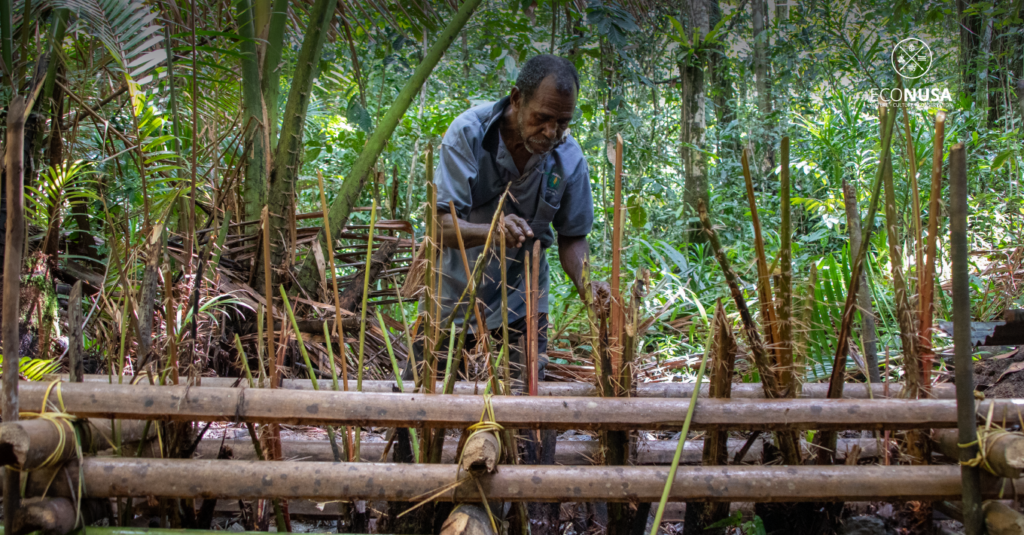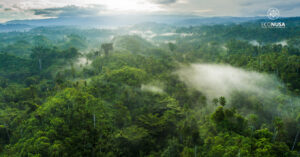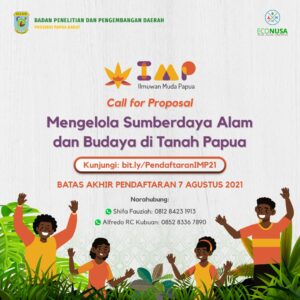
The first month of 2023 ended with good news for the people of Moi Tribe, especially those who live in Kwakeik Village in the Klayili District, Sorong Regency, Southwest Papua. The Acting Regent of Sorong, Yan Piet Moso announced a Decree of the Regent of Sorong No. 593.2/KEP.77/TAHUN 2023 concerning Recognition of the Rights of Ulim Abgies Pela Gelek. Gelek Ulim Abgies Pela is part of the Moi Tribe. Its customary territory is located in Kampung Kwakeik which is directly adjacent to five gelek (the name for clans in the Moi language), namely Ulim Abgies Kiem, Ulim Abya Pela, Mobalen Klatomok, Kadakolo Awenolo, and Kadakolo Tiliwolo.
“We are very pleased with great support and cooperation from the local government throughout the whole process, from mapping process, customary assembly, verification, to the issuance of a decree regarding our customary territories,” Pile Ulimpa, representative of indigenous peoples in Kwakeik village expressed his excitement through a phone interview on Monday, February 6, 2023.
Read also: Tribal Assembly on Recognition of Ulim Abgies Pela and Ulimpa Obokmala Clans Rights Running Well
Pile explained that the indigenous people in Kwakeik Village have fought for over a year for their customary territory to be officially recognized by the local government. “We know the area of our customary territories, but we have not met the requirements yet (to receive recognition from the government), until now,” said Pile.
Throughout the process of obtaining this customary territory decree, EcoNusa with the Ikatan Pelajar Mahasiswa Kampung Kwakeik Raya/IPMKKR (Kwakeik Raya Student Association) were involved and worked hand-in-hand with the local communities. Including the support for customary land mapping, as one of the fundamental requirements from the local government in the process of recognizing customary land.
The process was then followed by a customary assembly in order to obtain recognition from the gelek whose territories intersect with their customary territories. The first assembly was held in 2021 and the second one was held on 13 May 2022 in Klayili Village, Klayili District. The outputs of the customary meeting are important for the customary territory recognition process because it contains agreements that must be agreed upon by all clans domiciled nearby to prevent future conflicts.
Read also: Public and Youth Hope for Governor Regulation on Indigenous People Recognition in West Papua
Pile also explained that customary land recognition has an important meaning for indigenous people as they rely on their land to meet their daily needs. “This land is very important for indigenous people, especially for us the Moi Tribe, this is like our mother. The land is our pharmacy, the land is a market. We can hunt for meat, catch fish or find wood, according to our way of life,” said Pile.
The recognition from the government of the customary land is very important for local communities, as a legal basis that will protect them from various possible conflicts including management conflict with the private sector. Pile said, between 1992 and 2008, a timber company operated in their customary land areas and the company only gave compensation of Rp. 10 million for every gelek. The communities felt that the compensation amount was not fair compared to the benefits that the community might get if they manage their customary lands themselves.
Customary land recognition is not not only important for the existence of indigenous peoples from a political perspective, but also important to increase their local economy. In line with this, Pile hopes that the decree on the customary territory of Kampung Kwakeik can encourage the community to achieve economic authority and lead them to become a prosperous society. “We hope that the government will continue to support and be involved with us in producing potential local products that we manage, such as local salt, rattan, resin, and traditional medicines,” Pile concluded.
Editor: Nur Alfiyah and Swiny Adestika




